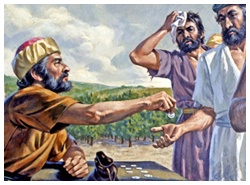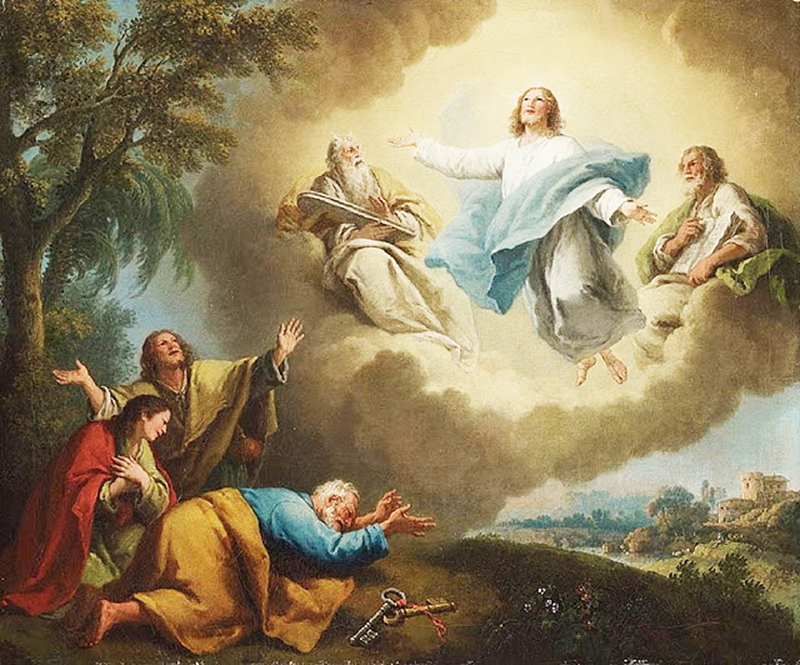Chúa nhật 26 Thường niên A

26th Sunday in Ordinary Time
Reading I: Ezekiel 18:25-28 II: Philipians 2:1-11
Chúa Nhật 26 Thường Niên
Bài Đọc I: Êdêkien 18:25-28 II: Philiphê 2:1-11
-----------o0o-----------
Gospel
Matthew 21:28-32
28 "What do you think? A man had two sons; and he went to the first and said, 'Son, go and work in the vineyard today.'
29 And he answered, 'I will not'; but afterward he repented and went.
30 And he went to the second and said the same; and he answered, 'I go, sir,' but did not go.
31 Which of the two did the will of his father?" They said, "The first." Jesus said to them, "Truly, I say to you, the tax collectors and the harlots go into the kingdom of God before you.
32 For John came to you in the way of righteousness, and you did not believe him, but the tax collectors and the harlots believed him; and even when you saw it, you did not afterward repent and believe him.
Phúc Âm
Matthêu 21:28-32
28 Các ông nghĩ sao: Một người kia có hai con trai. Ông ta đến nói với người thứ nhất: "Này con, hôm nay con hãy đi làm vườn nho".
29 Nó đáp: "Con không muốn đâu!" Nhưng sau đó, nó hối hận, nên lại đi.
30 Ông đến gặp người thứ hai, và cũng bảo như vậy. Nó đáp: "Thưa ngài, con đây!" nhưng rồi lại không đi.
31 Trong hai người con đó, ai đã thi hành ý muốn của người cha?" Họ trả lời: "Người thứ nhất". Đức Giêsu nói với họ: "Tôi bảo thật các ông: những người thu thuế và những cô gái điếm vào Nước Thiên Chúa trước các ông.
32 Vì ông Gioan đã đến chỉ đường công chính cho các ông, mà các ông không tin ông ấy; còn những người thu thuế và những cô gái điếm lại tin. Phần các ông, khi đã thấy vậy rồi, các ông vẫn không chịu hối hận mà tin ông ấy".
Interesting Details
• Context: The chief priests and the elders challenged the authority of Jesus, starting a lengthy and harsh confrontation, which firmed up their decision to arrest and kill Jesus.
• According to Pilch, a Christian missionary told this story in the Middle East but changed the question to "Which was the better son?" and most people said that the son who said yes but not doing it was better. It is more important to reply respectfully than to perform the act itself. Thus Jesus' teaching, that the action counts even when there was an initial disrespect, was surprising to these people, though probably not so to most Westerners.
• (v.31) Tax collectors are bad because they often cheat people, and they took money from the Jews to give it to the alien oppressors, the Romans.
• Prostitutes are bad not only because of their sexual sins but also because they often sold their services to the Roman soldiers.
• Who are the ones who said no but repented? There are various interpretations. They can be sinners, as the terms "tax collectors and harlots" indicate. They can also be pagans (Jerusalem Bible). Nowadays, they can be those who do not belong to the mainstream such as the "moral majority."
• The story only said that the son "he repented and went", but did not say how well he did it. Thus repentance and good intention is more important than the outcome of the task.
• Conversely, who are the ones who said yes but did not obey? They can be the chief priests and elders of the people whom Jesus told the parable to. They can be Jews who did not accept Jesus. Nowadays, they can be the church people who say all the right things and be in all the right places but do not love others as Jesus commands.
Chi Tiết Hay
• Khung cảnh: Các thượng tế và kỳ lão trong dân chống đối Chúa, đụng độ nảy lửa, làm họ nhất tâm bắt giết Chúa.
• Một nhà truyền giáo kể lại dụ ngôn này cho dân miền Tiểu Á, nhưng đổi câu hỏi thành "Đứa con nào ngoan hơn?" thì đa số mọi người trả lời là đứa nói vâng mà không làm vẫn ngoan hơn. Đân đó, cũng như người Việt, trọng cử chỉ lễ giáo, nên thà nói năng lễ độ mà không làm còn hơn là có làm nhưng nói hỗn hào. Vì vậy Chúa hỏi ai thi hành, chứ không hỏi ai ngoan hơn.
• (c.31) Người thu thuế xấu xa vì hay gian dối, hơn nữa lại lấy tiền của người Do Thái đem nộp cho kẻ ngoại bang dô hộ là dân La Mã.
• Giới đĩ điếm xấu không phải chỉ vì tội tính dục mà còn vì hầu hạ kẻ thù La Mã.
• Đứa con nói ngang nhưng rồi hối hận và làm, là hình ảnh của ai? Là kẻ có tội, như giới thu thuế và đĩ điếm; hay là dân ngoại; ngày nay có thể là những nhóm không được đa số xã hội chấp nhận.
• Câu chuyện chỉ nói đứa con đó hối hận và ra đi, chứ không nói làm hay làm dở thế nào. Vậy điểm chính là ăn năn và có ý muốn làm, chứ không tùy thuộc vào kế quả công việc.
• Còn đứa nó vâng mà không làm là ai? Là giới tu sĩ và lãnh đạo mà đang chất vấn Chúa; là dân Do Thái, dân Chúa nhưng không nhận biết Chúa; ngày nay có thể là các nhà lãnh đạo tôn giáo hay chính trị nói hay nhưng không theo luật tình yêu của Chúa.
One Main Point
The response to Jesus is a critical. Those who truly do the will of God will enter the kingdom.
Một Điểm Chính
Điều quan trọng nhất trên đời là ta đáp trả lại lời mời gọi của Chúa Kitô như thế nào. Ai làm theo thánh ý Chúa thì sẽ được hưởng Nước Trời.
Reflections
1. Listen to Jesus saying to me, "Son, go and work in the vineyard today." What is the vineyard, and what work does Jesus invite me to do?
2. Examine my good deeds. Are they more external like the son saying yes (which is good and important), or are they following what God wants me to do?
Suy Niệm
1. Ta lắng nghe tiếng Chúa mời gọi, "Này con, hôm nay con hãy đi làm vườn nho". Chúa gọi tôi làm gì?
2. Tôi theo Chúa bằng môi mép và bên ngoài, nhưng tôi có thật sự yêu mến anh chị em quanh tôi không?
bài liên quan mới nhất

- Hiệp sống Tin Mừng: Chúa Nhật 2 Mùa Chay năm A
-
Hiệp sống Tin Mừng: Chúa nhật 1 Mùa Chay năm A -
Hiệp sống Tin Mừng: Thứ Tư Lễ Tro -
Hiệp sống Tin Mừng: Mồng Ba Tết - Thánh hóa công ăn việc làm -
Hiệp sống Tin Mừng: Mùng Hai Tết - Cầu Cho Tổ Tiên Ông Bà Cha Mẹ -
Hiệp sống Tin Mừng: Mùng Một Tết Nguyên Đán -
Hiệp sống Tin Mừng: Thánh lễ Giao thừa -
Hiệp sống Tin mừng: Chúa nhật 6 Thường niên năm A -
Hiệp sống Tin mừng: Chúa nhật 5 Thường niên năm A -
Hiệp sống Tin mừng ngày 02/02: Lễ Dâng Chúa Giêsu Trong Đền Thánh (Lễ Nến)
bài liên quan đọc nhiều

- Tâm tình Mùa Chay
-
Hiệp sống Tin mừng: Chúa nhật 5 Phục sinh năm C -
Hiệp sống Tin mừng: Chúa nhật 14 Thường niên năm A -
Hiệp sống Tin mừng: Chúa nhật Chúa Thánh Thần hiện xuống -
Hiệp sống Tin mừng: Chúa nhật 13 Thường niên năm B -
Hiệp sống Tin mừng: Chúa Giáng sinh (Lễ Đêm - Rạng đông - Ban ngày) -
Hiệp sống Tin mừng ngày 29/06: thánh Phêrô và thánh Phaolô tông đồ -
Hiệp sống Tin mừng: Chúa nhật 29 Thường niên năm B -
Hiệp sống Tin mừng: Chúa nhật 3 mùa Chay năm B -
Hiệp sống Tin mừng: Chúa nhật 19 Thường niên năm C


